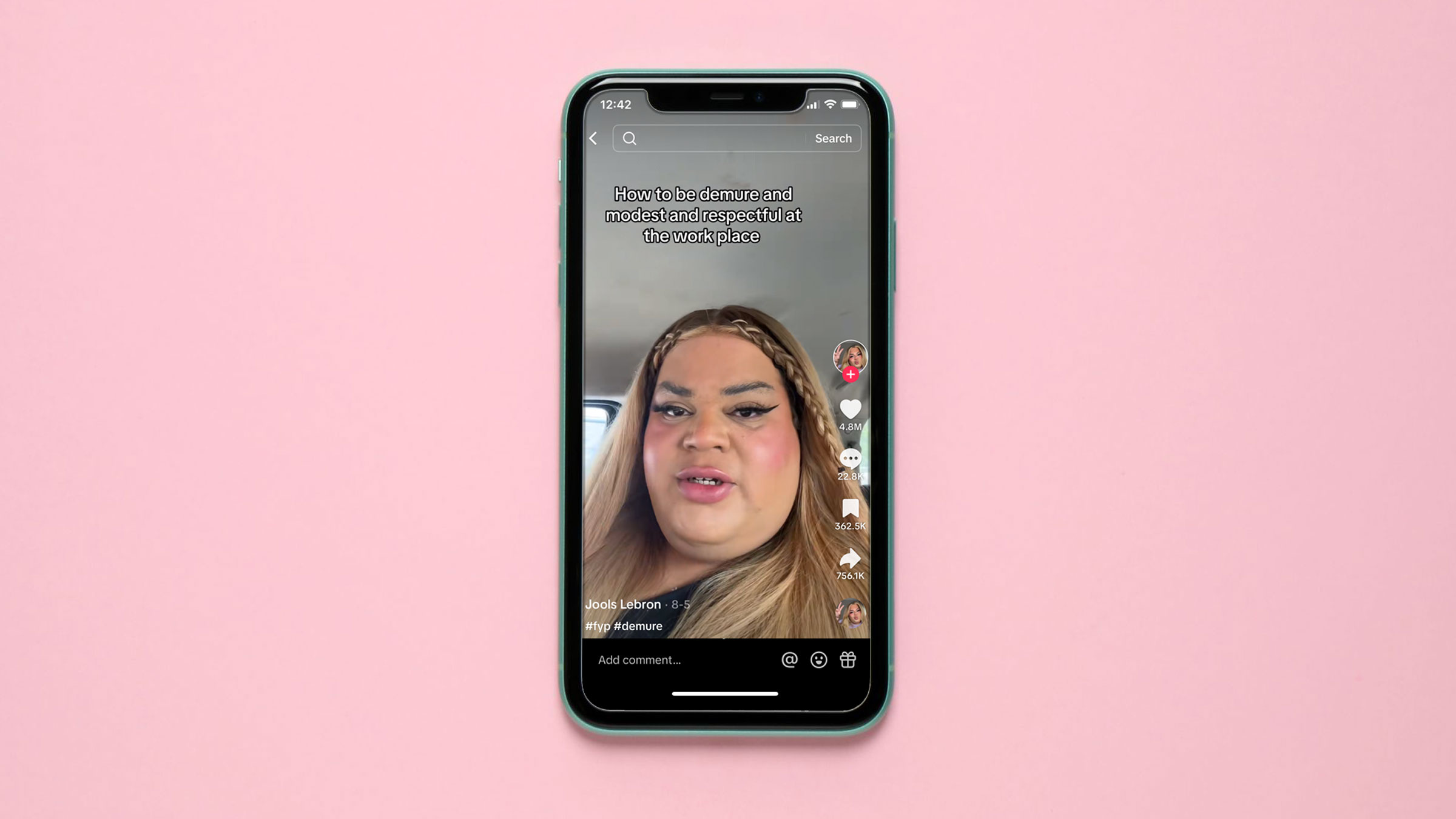The word “mindful” is having a viral moment, the likes of which we haven’t seen since Jon Kabat-Zinn’s introduction of Mindfulness-Based Stress Reduction in the late ’70s. This time, it’s through TikTok user Jools Lebron and her popular phrase “very mindful, very demure.”
When I first saw Lebron tossing around the word “mindful” along with the word “demure,” in an intoxicating way — a way that plays liberally with the definitions of both words — I noticed it right away. It piqued my interest not just as a social media watcher and pop culture writer, but also as a Buddhist. What might people make of “mindful” in this context?
For the uninitiated, Lebron rose to internet fame a few weeks ago with a TikTok video that she started with the thesis statement, “You see how I do my makeup for work? Very demure, very mindful.” It was her singular cadence that sold the idea, as well as her identity as a trans woman. Don’t test your employers, she seemed to be saying. Give them the same person you presented in the interview. “The way I came to the interview is the way I go to the job,” she said. “A lot of you girls go to the interview looking like Marge Simpson and go to the job looking like Patty and Selma,” she continued, referencing The Simpsons matriarch and her sisters. “Not demure.”
“She’s spreading joy, while also embracing the good and the bad, the messy and the pure”
I loved her immediately when I first saw her viral video, captivated by her cadence and natural charisma. It was clear that her way of saying things was at least as important and distinctive as what she said, her instantly meme-able style reminding me of Bill Hader’s Stefon character from Saturday Night Live: “New York’s hottest club is …” But I didn’t truly get her until a few videos in, when she had already achieved a level of internet fame and was making her intent more clear with a video about visiting CVS after a crazy night in Vegas. “A lot of you ladies do way too much to go to the CVS. You see me, my spray tan blotching off? Very demure, very mindful. I have Taco Bell refried beans stuck in my hair. I’m very cutesy with it.”
And thus I was enlightened: Jools Lebron was playing with us. She was not always demure or mindful, by their traditional definitions or even by the new ones she had so recently established.
Because her videos went so viral, many thinkpieces have been written about them, some declaring Lebron’s “demure” movement the antidote to “brat summer,” while others have quoted those who are worried that embracing demureness gets too close to Victorian ideals and oppressive standards for women. Most of the fuss has been over the word “demure” and its respectability-politics connotations. Meanwhile, even though she uses it nearly as often, “mindful” has been quietly along for the ride.
This is not the stuff of the Satipatthana Sutta, but it might be a little bit of Taoist Wu wei — effortless action or non-action. There is, I believe, an element of real mindfulness to Lebron’s use of the word: she is advocating being conscious of what one is doing. She advocates for paying attention to the way your hair sits as you leave for work or how you enter or exit an airplane. There’s a calm to both her ideas and her delivery of them. When it comes to the real Buddhist conception of mindfulness, however, she only crosses over into that territory once in a while, most notably in her video on what to do at the end of a commercial flight: “I don’t get up immediately, I don’t rush.”
Maybe I’m reading too much into this, but I love the idea of sitting calmly, following your breath, as you wait for the time to deboard. The same goes for lining up to get on the plane: You don’t need to line up before it’s time! You can’t make time go faster by crowding the gate! Not rushing is big for her. So is simplicity. She’s also mindful in a borderline-Buddhist way when she stays at a hotel, leaving her room neat (and giving doughnuts to the staff, which isn’t necessarily Buddhist, but is very thoughtful).
On the other hand, is it Buddhist-mindful to send “cutesy” photos to our mothers? This hasn’t come up in any of the koans or sutras I’ve read, but it’s pretty nice. Is it Buddhist-mindful to do braids and flatiron your hair to go to the Las Vegas Strip? Not particularly. (But it looks great.)
Much of Lebron’s real message stems from a Buddhist-mindfulness-adjacent place: online “wellness” culture, which has co-opted the language of health and spirituality to sell expensive potions, equipment, apps, and techniques, often to women. Actress-turned-entrepreneur Gwyneth Paltrow’s Goop empire perfected this, and indeed not long ago advocated for what she calls “eyes-open meditation” — in other words, Buddhist meditation — adding to its pantheon of ridiculous attempts to start trends, whether jade vagina eggs or conscious yawning. Dress for the job you want, Goop very recently whispered in a style roundup that could very well say “very demure, very mindful.” Lebron is poking fun at this world of (mostly white, wealthy, cisgender) women making their name online by telling each other, in soothing tones, how to be.
In any case, these many related strands came together to make Lebron an online phenomenon. Since making “demure and mindful” happen, she’s been imitated by many, appeared on Jimmy Kimmel Live, and, as she’s said, made enough money to move forward with her gender transition. She’s also become involved in a battle to trademark her catchphrase, even though several unrelated people appear to have beaten her to it.
Overall, however, the “demure and mindful” trend seems to have been good, not only for Lebron but for humanity in general. One of my favorite young comedians, Josh Johnson, noted the uniqueness of this in a recent set: “By and large, everything that I’ve seen that has come from it has been pretty positive. … Most TikTok challenges or trends are like, ‘Hey, y’all, watch me punch my grandma in the back of the head. It’s usually something that causes harm to you or someone else for everyone’s entertainment.”
But Lebron has only spread joy, Johnson notes before holding forth on something that seems unrelated: a Buddhist friend who explained the Four Noble Truths to him, including, most interestingly, the truth that all humans suffer, and the fact that Buddhism presents a path to ending this suffering. Still, Johnson explains, he has been surprised to learn that even Buddhist monks don’t know how to handle their own suffering sometimes, as evidenced by scandals that have rocked Buddhist monasteries throughout the world — monks doing meth, monks stealing millions from the donations they collect.
Then he brings it back to Lebron: “It’s wild to me that this section of Buddhist monks in Thailand, all they really need is Jools Lebron to teach them how to be demure, to teach them how to be mindful. Can you imagine that? There’s a monk that’s just throwing out money at the strip club, and then Jools is like, ‘Not demure, not mindful.’”
That imaginary scene will stick with me for a while, and will make me wonder if Jools Lebron knows more about mindfulness — even the Buddhist kind — than we thought. She may not be actively channeling Buddhism, but she might really be able to teach those wayward monks — and all of us — a thing or two about tuning back into themselves and following their better instincts. She’s spreading joy, while also embracing the good and the bad, the messy and the pure, waiting calmly to deplane when she can and also accepting the Taco Bell refried beans in her hair when they happen. In the end, her playful humor might be the most Buddhist thing of all about her version of mindfulness.

